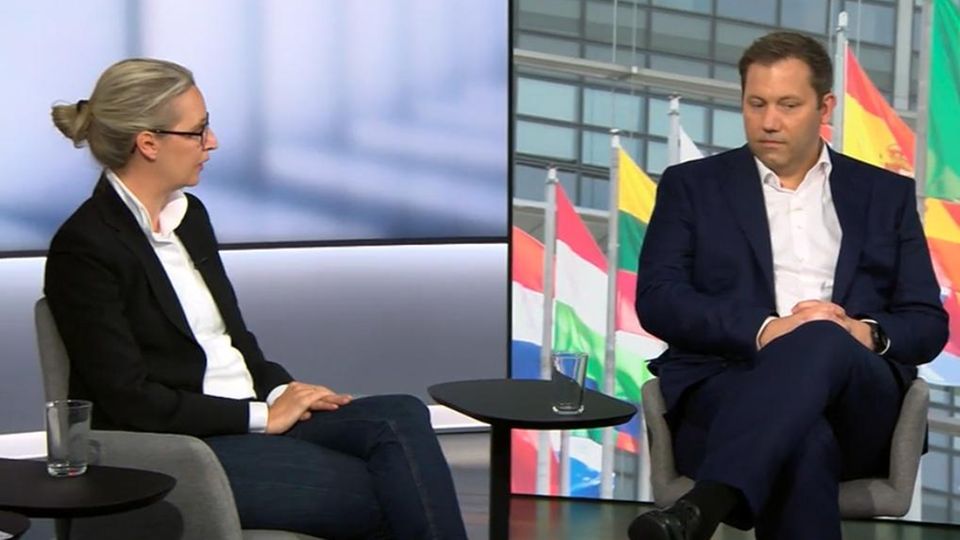It can close ranks or lead to political ruin: the vote of confidence in the Chancellor in the Bundestag. CDU General Secretary Carsten Linnemann has brought it into play once again after the European elections. But what would Olaf Scholz have to gain from it?
The polling stations had barely closed when Carsten Linnemann went on the attack. “He should actually ask the question of confidence,” said the CDU general secretary on ARD, referring to Chancellor Olaf Scholz. “Either the traffic light coalition changes course or it has to clear the way for new elections.”
The demand is nothing new in itself – Linnemann has already made it public on other occasions – but this time the initiative is unlikely to simply go unnoticed in view of the disastrous European election results of the traffic light parties. The CDU general’s goal is clear: the Union should come to power before the scheduled federal election in 2025.
Question of confidence was asked five times
The only way to hold new elections at present is through a vote of confidence by the Federal Chancellor in Parliament, as regulated in Article 68 of the Basic Law: “If a motion by the Federal Chancellor to express his confidence in him does not receive the approval of the majority of the members of the Bundestag, the Federal President may, at the suggestion of the Federal Chancellor, dissolve the Bundestag within twenty-one days.”
The procedure is – theoretically – extremely simple. The Chancellor can take the initiative at any time and submit a motion to the Bundestag to express confidence in him. If he no longer has a majority behind him, he can ask the Federal President to dissolve parliament and call new elections. A lost vote of confidence would be proof that a federal government is no longer capable of acting. On the other hand, the vote of confidence can also be used to close the ranks of the government factions – if the majority of MPs stand behind the Chancellor. In this case, new elections would be off the table.
In the history of the Federal Republic, the head of government asked the question of confidence five times. In 1972, SPD Chancellor Willy Brandt lost the confidence of the majority of MPs after some parliamentarians switched to the Union faction. The Bundestag was dissolved, the SPD achieved a record result in the early elections, Brandt remained Chancellor – goal achieved.

“You just called me and the party Nazis”
01:38mins
In 1982, there were two showdowns in the Bundestag in Bonn. Questions of rearmament and labor market policy had led to rifts in the social-liberal coalition of Chancellor Helmut Schmidt (SPD); the vote of confidence was intended to discipline the alliance, and it succeeded: Schmidt remained in office for the time being – until the coalition collapsed in September 1982.
The then opposition leader Helmut Kohl (CDU) seized the opportunity and gathered a majority of Union and FDP representatives behind him and was elected as the new Federal Chancellor in a constructive vote of no confidence in accordance with Article 67 of the Basic Law. In order to legitimize himself for the office, he put forward a vote of confidence in December, but with the clear aim of losing it and thus bringing about new elections. According to the Basic Law, the Bundestag does not have the right to dissolve itself. The black-yellow coalition emerged as the winner of the early federal election in 1983 and Kohl as Chancellor.
It took 19 years before another chancellor went all-in: Gerhard Schröder (SPD) linked the vote of confidence to a concrete issue, namely the deployment of German troops to Afghanistan to support the US fight against international terrorism. There was unrest in the SPD and Green government factions over this issue; Schröder tested his power – and won.
Will the European elections be followed by new elections to the Bundestag?
Just four years later, Schröder again asked for a vote of confidence. This time, however – like his predecessor Kohl in 1982 – with the aim of losing the vote and bringing about new elections. The reasons for this included reforms in social policy that had met with widespread resistance and state elections that the SPD had lost. “Let’s give people the freedom to decide for themselves what kind of state they want,” declared the Chancellor. After the election, the red-green coalition was over, and Angela Merkel (CDU) and a grand coalition took power in the Federal Republic.
AI images
This is what Europe would (perhaps) look like if one party could do what it wanted
And now, in 2024, it’s the sixth vote of confidence and Linnemann’s dream of new elections is becoming a reality? From the perspective of the traffic light coalition, a vote of confidence by Olaf Scholz would be a pointless step, and none of the three governing parties would benefit from it in view of the European election results. As things stand, the SPD and the Chancellor would lose power, the Greens would fail and the FDP would even have to fear for a place in the Bundestag. Why should Scholz take this risk?
Especially since the possibility of a coalition breakdown is already looming over Berlin, keyword: upcoming budget discussions. This could lead to a final rift between the SPD, the Greens and the FDP. And then it could be the big moment for the strategists around Carsten Linnemann in the Konrad Adenauer House: Like Helmut Kohl once did, they could put together their own majority in the Bundestag, overthrow Olaf Scholz with a constructive vote of no confidence, elect a new chancellor – and then, in turn, use the vote of confidence to bring about new elections for their own legitimacy.
Sources: ; ; ; German Bundestag on questions of confidence , , , , ;
Source: Stern
I have been working in the news industry for over 6 years, first as a reporter and now as an editor. I have covered politics extensively, and my work has appeared in major newspapers and online news outlets around the world. In addition to my writing, I also contribute regularly to 24 Hours World.




